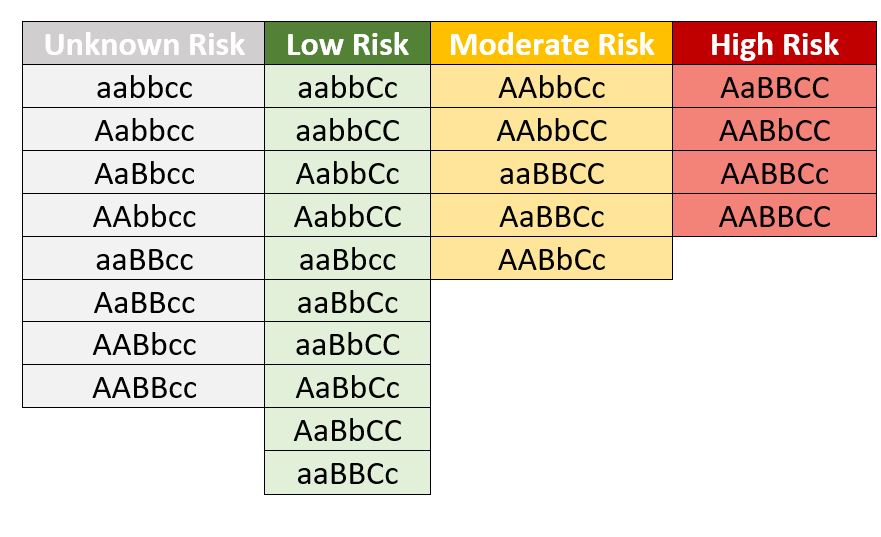Quick Summary
Phenotype: Affected dogs typically display hair loss and crusty/scaly skin lesions on the face, ears, tip of the tail and/or bony prominences of the legs and feet. Lesions may appear in adulthood or as early as 12 weeks of age. Muscle involvement can happen in more severe cases. Mildly affected dogs may display some muscle loss on the face whereas severely affected dogs can have difficulty eating, drinking and swallowing, and may display abnormal gait.
Mode of Inheritance: Complex Inheritance
Alleles: Genetic variants in 3 loci are associated with the risk of developing dermatomyositis in the Collie and Shetland Sheepdog.
Locus A: A = DMS risk allele; a = wildtype
Locus B: B = DMS risk allele; b = wildtype
Locus C: C = Risk allele (DLA-DRB1*002:01); c = other DLA haplotypes
Breeds appropriate for testing: Collie, Shetland Sheepdog
Explanation of results:
• Dogs with aa and bb, Aa and bb, aa and Bb, or Aa and Bb genotypes are at low risk for dermatomyositis with either CC or Cc genotypes.
• Dogs with aa, Bb and cc genotypes are at low risk for dermatomyositis.
• Dogs with aa, BB and Cc genotypes are at low risk for dermatomyositis.
• Dogs with AA, bb and Cc or CC genotypes are at moderate risk for dermatomyositis.
• Dogs with aa, BB and CC genotypes are at moderate risk for dermatomyositis.
• Dogs with Aa, BB and Cc genotypes are at moderate risk for dermatomyositis.
• Dogs with AA, Bb and Cc genotypes are at moderate risk for dermatomyositis.
• Dogs with AA, Bb and CC genotypes are at high risk for dermatomyositis.
• Dogs with Aa, BB and CC genotypes are at high risk for dermatomyositis.
• Dogs with AA, BB and Cc or CC genotypes are at high risk for dermatomyositis.
• Dogs with aa and bb or BB, Aa and bb or Bb or BB, AA and bb or Bb or BB genotypes with the cc genotype have an unknown risk for dermatomyositis due to limited representation in the study population.
Dermatomyositis (DMS) is an immune-mediated disorder that affects the blood vessels of the skin and muscle. The disorder is considered complex, being caused by genetic and environmental factors. DMS affects mostly Collies and Shetland Sheepdogs but a DMS-like phenotype has been described in Beaucerons and Corgis.
Affected dogs typically display hair loss and crusty/scaly skin lesions on the face, ears, tip of the tail and/or bony prominences of the legs and feet. Lesions may appear in adulthood or as early as 12 weeks of age. Muscle involvement can happen in more severe cases. Mildly affected dogs may display some muscle loss on the face whereas severely affected dogs can have difficulty eating, drinking, and swallowing, and may display abnormal gait.
A 2017 study identified 3 genes (also referred to as loci) that confer risk for developing DMS in the Collie and Shetland Sheepdog. Locus A consists of a single nucleotide substitution in the PAN2 gene that causes an amino acid change (p.Arg492Cys); locus B consists of an indel in the MAP3K7CL gene (c.383_392ACTCCACAAA>GACT); and locus C consists of a risk DLA haplotype. Below is a table showing the specific genotype combinations of these 3 loci that confer unknown, low, moderate or high risk for developing DMS.
Table 1: Genotype combinations associated with unknown, low, moderate and high risk of developing DMS in the Collie and Shetland Sheepdog.

Testing recommendations: Testing for DMS risk assists owners and breeders in identifying dogs that are at increased risk for developing DMS. Breeders can use results from the test as a tool for selection of mating pairs to avoid producing dogs at high risk for developing DMS.
